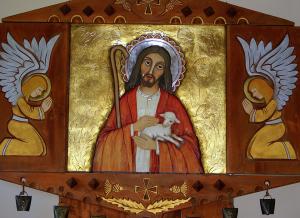
One of the more interesting and perhaps one of the most important titles Jesus uses for himself is that of the Good Shepherd (cf. Jn. 10:11). His audience would have understood that Jesus took on a title which tradition had given to God. The Psalms established the relationship between us and God as that of sheep with a shepherd, so that when we go astray, God would guide and direct us to safety: “The LORD is my shepherd, I shall not want” (Ps. 23:1 RSV). “Know that the LORD is God! It is he that made us, and we are his; we are his people, and the sheep of his pasture” (Ps. 100:3 RSV).
The prophets said that the people of Israel were God’s special flock. God gave some people authority to act as shepherds , but even they had to realize God remained the ultimate authority. Whatever authority they had, they got from God, and since it was derived from God, they would have to face the consequences of their actions if they abused or neglected the proper use of their authority and misled God’s sheep:
“Woe to the shepherds who destroy and scatter the sheep of my pasture!” says the LORD. Therefore thus says the LORD, the God of Israel, concerning the shepherds who care for my people: “You have scattered my flock, and have driven them away, and you have not attended to them. Behold, I will attend to you for your evil doings, says the LORD (Jer. 23:1-2 RSV).
In this way, though others could, metaphorically speaking, be seen as shepherds, God remained the one true shepherd, and as the true shepherd, God would personally do what was needed to take care of the flock:
For thus says the Lord GOD: Behold, I, I myself will search for my sheep, and will seek them out. As a shepherd seeks out his flock when some of his sheep have been scattered abroad, so will I seek out my sheep; and I will rescue them from all places where they have been scattered on a day of clouds and thick darkness (Ezek. 34:11-12 RSV).
Even when the sheep followed bad authorities and are scattered abroad because of it, such as happened with the Babylonian Exile, God still was concerned with the people of Israel and promised to bring them back together: “I will surely gather all of you, O Jacob, I will gather the remnant of Israel; I will set them together like sheep in a fold, like a flock in its pasture, a noisy multitude of men” (Mic. 2:12 RSV).
Thus, when Jesus called himself the Good Shepherd, we are meant to see it as an indication that he was more than just a man, but the God-man, the incarnate God who truly came searching for the lost sheep so that he could bring them back together into the fold:
I am the good shepherd; I know my own and my own know me, as the Father knows me and I know the Father; and I lay down my life for the sheep. And I have other sheep, that are not of this fold; I must bring them also, and they will heed my voice. So there shall be one flock, one shepherd (Jn. 10:14-16 RSV).
Speaking as the Good Shepherd, as God who looks after the wayward sheep, Jesus indicated that God’s care and concern was for all, and not just the people of Israel. God wanted to bring everyone together as one. This did not mean he disregarded the special place of the people of Israel. He was interested in them, and his primary focus in his earthly ministry was with them. But what he wanted to make clear was that his concern was not an exclusive concern: he loved all humanity,
Thus, by calling himself the Good Shepherd, not only did Jesus indicate his divinity by using a quality normally used for God, he fleshed out the meaning of that title. He showed the great love and devotion God had for us, for the lost sheep. Nothing, not even death, would stand in his way of bringing back the lost sheep. The people of Israel had the pride of place in salvation history. They were the people chosen for the incarnation. They were the first to hear his preaching. They were told that God truly would provide to them what they desired, that is, the kingdom of heaven. “Fear not, little flock, for it is your Father’s good pleasure to give you the kingdom”(Lk. 12:32 RSV). When he was among the people of Israel, his love and care for them made itself known in the way he lifted them up with his miracles. He also showed it in the way in which he promoted the cause of the people over the religious and secular authorities who had abandoned their responsibilities by seeking power for their particular desires instead of using it to promote the common good. He fulfilled the promises of the prophets, so that those who were of a discerning mind, could see that God truly had come amongst them.
Jesus, therefore, is the Good Shepherd. Those who follow after him are his sheep. He opens the way for us to enter into the presence of God, that is, the kingdom of God. We can try to gain entry into the kingdom of God by ourselves, trying to break in and enter like thieves, but we will find that we will not be welcome and will be cast away. We must humble ourselves and acknowledge our need for him. Then we will welcome his guidance and follow him to heaven:
So Jesus again said to them, “Truly, truly, I say to you, I am the door of the sheep. All who came before me are thieves and robbers; but the sheep did not heed them. I am the door; if any one enters by me, he will be saved, and will go in and out and find pasture. The thief comes only to steal and kill and destroy; I came that they may have life, and have it abundantly (Jn. 10:7-10 RSV).
It is interesting to note many people, including those who call themselves Christians, now consider it bad to be called “sheep.” It is used as a derogatory term, suggesting that someone is a follower instead of being self-sufficient and capable of thinking for themselves. The fact of the matter is that no one truly comes to know all things by their own personal experience. No one is an island capable of doing all things themselves. We need each other. We need experts who can speak on those matters which we do not have the time or ability to engage ourselves. It is vanity, pride, and hubris, which makes people think they are free thinkers who do not rely upon others. We must understand that we are in this world together, and instead of just listening to those who say what we want to hear, we must acknowledge experts and heed their advice when it runs contrary to our desires. It is delusional thinking, not free-thinking, to deny reality.
While, it is obvious why so many do not want to learn from and heed the advice of experts because it often means they must change their ways and do things which might be otherwise inconvenient in their lives (such as happened with COVID19), it is surprising that so many Christians accept that line of reasoning for themselves. Can they not see how Jesus warned them against such hubris? Certainly God wants us to use our minds, but God does not want us to use them for selfish purposes, using them to selfishly elevate ourselves over the common good. That is what thief tries to do: they do not think of others, they do not think of those they hurt by their actions; all they think about is themselves and their own little pleasures. Jesus, however, would have us use our hearts and minds to follow after him. We must accept that we are followers. There is nothing bad or insulting about that, indeed, there is much good, because it frees us from trying to do all things ourselves. Everyone has the good which they can do, the things which they know, and the things which they cannot do and the things which they do not have the time or ability to know. Humility recognizes this fact and allows us therefore to achieve much more than if we follow through with pride and think we can know and do the things which we can’t.
To be a “sheep” in Scripture is good a thing, for it is what leads to salvation; it tells us that we are not in this world alone, that we are not like a thief, concerned only about ourselves. We cannot break into heaven. Only if we humbly accept being guided by God and follow through with the examples given to us by Jesus can we be saved. Only if we humbly accept being “sheep” shall we actually receive glory. Jesus is the Good Shepherd. Will we follow after him, or will we follow after Satan and try to rise up and do all things ourselves, and so stumble and fall out of our pride?
Stay in touch! Like A Little Bit of Nothing on Facebook.
If you liked what you read, please consider sharing it with your friends and family!













